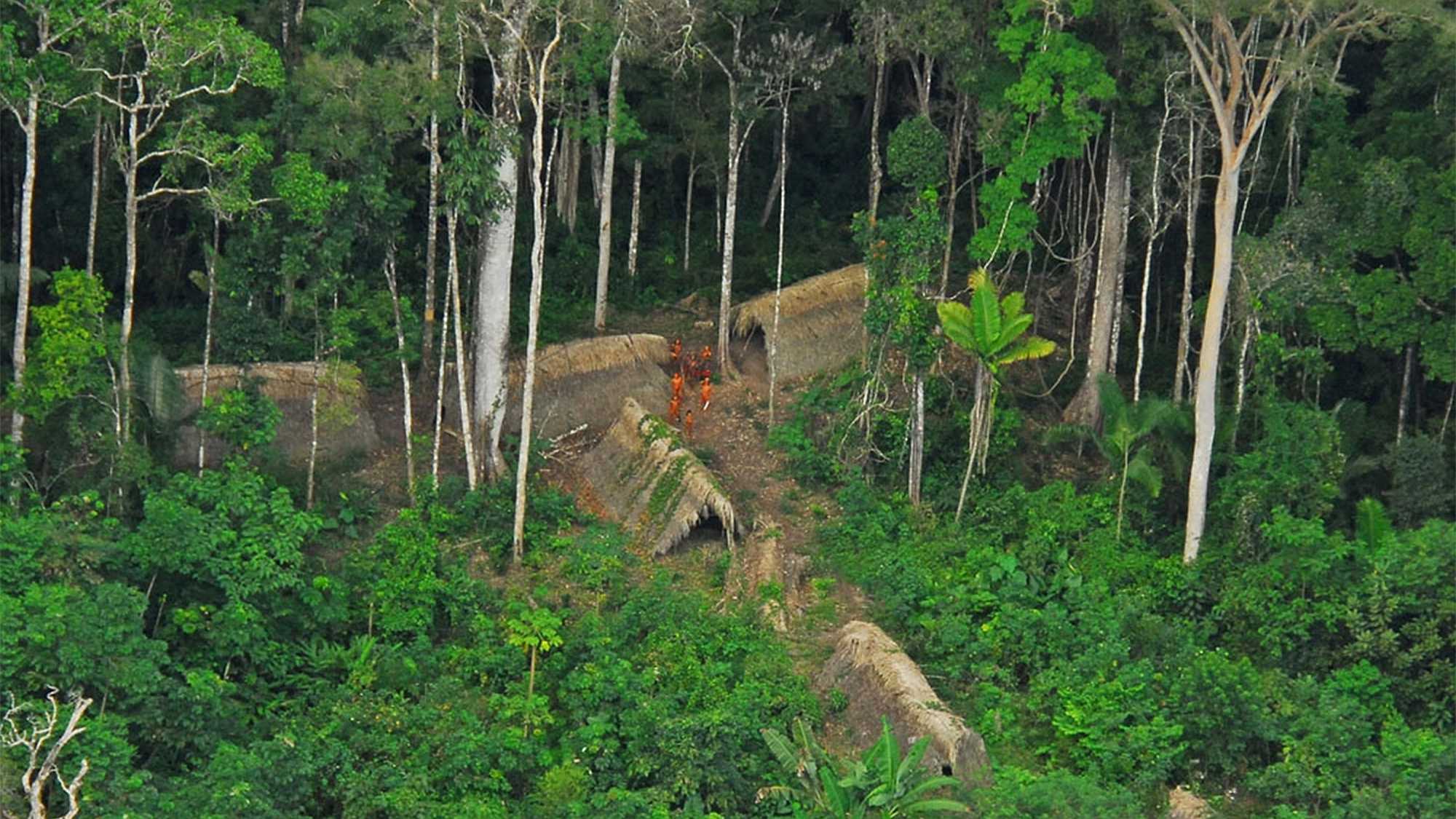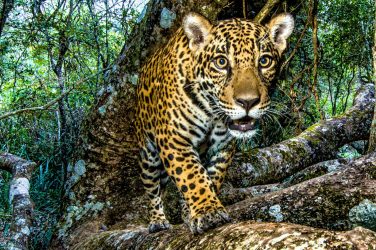Brazil’s highest court has upheld a ban on missionary activity inside reserves that are home to isolated or recently contacted Indigenous people, in a bid to protect the communities against COVID-19.
Although the country’s official indigenist policy toward these groups since 1987 has been to not engage in any contact, regardless of whether there’s a pandemic, a federal law passed in July 2020 allows religious missionaries to remain inside these reserves. This triggered a lawsuit by Indigenous and political organizations, which the Supreme Federal Court (STF) has now ruled in favor of.
The 2020 law attempted to “legitimize something that is already forbidden,” said Carolina Ribeiro Santana, a lawyer for the Observatory for the Human Rights of Isolated and Recently Contacted Indigenous Peoples (OPI), one of the co-authors of the lawsuit. “As we are under an anti-Indigenous government, it is important to have a decision which reassures the Indigenous policy.”
OPI authored the lawsuit along with the Articulation of the Indigenous Peoples of Brazil (Apib) — the country’s largest Indigenous organization — and the Workers Party (PT). Justice Luís Roberto Barroso issued the court’s ruling on September 24.
Last year, the court had already forbidden the entry of outsiders into these areas while hearing another case where Indigenous organizations urged the federal government to implement measures, including imposing sanitary barriers, to protect the Indigenous population from COVID-19.
“In the current situation, where there is an ongoing pandemic, the peoples in isolation and recent contact are the most exposed to the risk of contagion and extinction,” Barroso said in that earlier ruling.
But threats against uncontacted Indigenous groups have escalated under the government of President Jair Bolsonaro, who has called for Indigenous people to be “integrated into society.” Bolsonaro’s hostility toward Indigenous people is no secret; last year, in his weekly live transmission on social media, he declared that, “more and more, the Indigenous is a human being just like us.”
At the same time, Bolsonaro is hugely popular with Brazil’s evangelicals, who are credited with helping him win the 2018 election. (His middle name translates to “Messiah.”)
Once in office, he appointed evangelical leaders to key posts in his administration, including Ricardo Lopes Dias, who, until November 2020, headed the department responsible for protecting isolated and recently contacted communities at Funai, the Indigenous affairs agency.
Dias was a pastor with the New Tribes Mission, an evangelical group notorious for reportedly spreading disease among the Zo’é people living in northern Pará state. More than a third of the Zo’é population subsequently died. Another top official, Damares Alves, the minister for women, family and human rights, is also reportedly linked to missionary groups, according to BBC News Brasil.
“These people choose isolation,” anthropologist Aparecida Vilaça, from the National Museum of the Federal University of Rio de Janeiro, told in a phone interview. “What the state has to do is to not let anyone get in.”
One of the reasons for this isolation, according to Indigenous organizations, is precisely the trauma of almost being exterminated by the diseases brought by non-Indigenous people, like influenza, measles and malaria; Indigenous people, especially isolated ones, don’t have immunity to many of these pathogens.
But the threat of disease isn’t the only one introduced by missionaries, even to non-isolated groups. According to lawyer Eliésio Marubo, from Vale do Javari reserve in northern Amazonas state, missionaries undermine the social cohesion of the community by favoring the leaders who support them.
“The culture of our people is also weakened because certain practices are forbidden [by the missionaries], like traditional medicine,” Eliésio Marubo said. “The relationship with the territory also changes. Before, we used to move around a lot, but the missionaries want us to stay in one place only.”
Vale do Javari is home to the largest number of isolated Indigenous people in the world: 10 out of the 28 confirmed groups of isolated people in Brazil. The reserve is also home to non-isolated Indigenous groups, like the Marubo.
“It is a cultural destruction,” anthropologist Aparecida Vilaça said of the missions’ presence in Indigenous reserves. Vilaça witnessed the effects of missionary groups on an Indigenous community in Rondônia, also in the Amazon region. “They do a very deep process of humiliation of the traditional practices, by saying their dances and beliefs are things of the devil,” she said.
According to Vilaça, these changes in the traditional way of life make the Indigenous people more vulnerable to several economic interests. “The missionaries lead to the settling of all the community in the same place, releasing land to farmers and loggers. We can’t forget that these lands are very coveted,” she said.
Vilaça said the desire to convert Indigenous groups started with the colonization of Brazil, by the Catholic Church, and is now led by evangelical groups, some of which have deep pockets.
Rejection of “Consentement” Thesis
As the lawyer for Univaja, the Union of Indigenous People of Vale do Javari, Eliésio Marubo went to court last year against Andrew Tonkin, a U.S. evangelical Baptist missionary who was planning to travel to the reserve amid the pandemic to contact isolated Indigenous groups.
“Missionaries have been harassing us for 60 years,” he said. “They have helicopters, airplanes and they fly from here to the United States.”
Besides granting Univaja’s request to ban Tonkin’s entry, a federal court also ordered the expulsion of missionaries still inside the territory. Despite the victory, the missionaries are still lurking, Eliésio Marubo said. “They remain on the borders of the reserve, trying to co-opt people,” he said.
In a setback for the Indigenous groups, Justice Barroso denied their request to remove the missionaries already inside the reserves. Besides creating a risk of contagion, Barroso said — since evicting them could “require third parties to enter such areas” — it was not clear that isolated groups had not consented to their presence.
“How can you give consent for something that you have no idea what it is? To people who don’t even speak their language?” Vilaça said. She added that missionaries use several strategies to win over the isolated people. “They offer axes, knives, and other benefits to those who join them.”
In their argument to the STF, the Indigenous groups noted that the way isolated communities express their will is different from the rest of society. “Our society gives prevalence to speech, to writing, and these people are talking to us in a different way. When they run away or attack an approaching person, it is a way of saying no,” Santana said.
Barroso’s ruling is a precautionary measure, meaning the case will be subject to trial in the STF plenary. In a statement, the office of Brazil’s attorney general said it had been notified of the decision but will only manifest in the court. Funai didn’t reply to requests for comment.
This article appeared originally in Mongabay. Read the original article here: https://news.mongabay.com/2021/10/brazil-court-emphasizes-ban-on-missionaries-trying-to-contact-isolated-indigenous/






